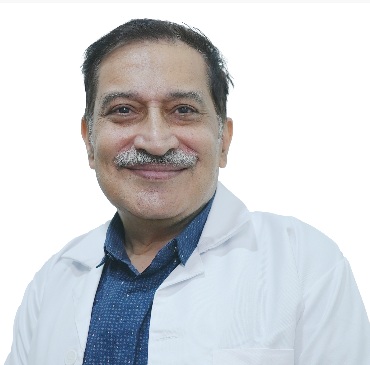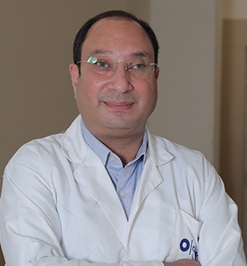Shoulder Replacement Surgery : Cost, Procedure & Recovery

Treatment Duration
60 Minutes
------ To ------90 Minutes
Treatment Cost
₹ 1,00,000
------ To ------₹ 2,00,000

Table of Contents
- What is Shoulder Replacement Surgery?
- Who needs Shoulder Replacement Surgery?
- What will happen if Shoulder Replacement Surgery is Delayed?
- How is Shoulder Replacement Surgery Performed?
- What to Expect Before the Shoulder Replacement Surgery?
- What to Expect on the Day of Shoulder Replacement Surgery?
- What to Expect During Shoulder Replacement Surgery?
- What is Recovery and Post Op. Care after Shoulder Replacement Surgery?
- When to Consult a Doctor?
Shoulder replacement surgery, also known as arthroplasty, removes the damaged areas of bone and replaces them with parts made of plastic and implants metal. The shoulder joint is a ball and socket joint, and damage to it can cause weakness, pain, and stiffness. The shoulder implants are present in different shapes and vary in size.
You can check Shoulder Replacement Surgery Cost here.
What is Shoulder Replacement Surgery?
Shoulder replacement surgery, also known as arthroplasty, removes the damaged areas of bone and replaces them with parts made of plastic and implants metal. The shoulder joint is a ball and socket joint, and damage to it can cause weakness, pain, and stiffness. The shoulder implants are present in different shapes and vary in size.

Expert Doctors (10)
NABH Accredited Hospitals (10)


Who needs Shoulder Replacement Surgery?
This procedure relieves pain and other symptoms that result from damage to the shoulder joint. The conditions that can cause damage to the joint include:
- Osteoarthritis - It damages the cartilages that cover the ends of the bones.
- Rotator cuff injury - A rotator cuff is a group of muscles and tendons that cover the shoulder joint, which may cause damage to the shoulder joint when injured.
- Osteonecrosis - The shoulder conditions can affect the blood flow to the humerus, leading to bone collapse.
- Rheumatoid arthritis - It damages the cartilage and underlying bone in the joint.
What will happen if Shoulder Replacement Surgery is Delayed?
If the surgery is delayed, you may notice the following:
- Severe shoulder pain will lead to swelling and inflammation if left unnoticed.
- You will have limited shoulder movement.
- You will no longer be able to relieve your pain with medications such as ibuprofen, acetaminophen, etc.
- You won’t be able to take part in activities you used to because of the continuous pain in the shoulder.
- You may encounter severe problems such as rheumatoid arthritis, ankylosing spondylitis, and other inflammatory disorders
How is Shoulder Replacement Surgery Performed?
The procedure removes the damaged parts of the shoulder and replaces them with artificial components, called a prosthesis. During shoulder replacement surgery, either replacement of the head of the humerus bone(ball) or both ball and socket replacement is done.
Depending on the condition of the patient, these are the types of surgery that are performed:
Total shoulder replacement
- This involves replacing the arthritic joint surfaces with a highly polished metal ball attached to a stem and plastic socket.
- This component varies in size. They are either cemented or press-fit into the bone.
- If the bone is in good shape, the surgeon will choose non-cemented (press-fit) and vice-versa.
- Doctors recommend this surgery highly for patients with osteoarthritis and intact rotator cuff tendons.
Stemmed hemiarthroplasty
- In this process, the surgeon will only remove the head of your upper arm and replace it with a prosthesis that will look like a metal ball attached to a stem.
- This procedure is recommended for patients with healthy bone sockets that don’t need replacing.
Resurfacing hemiarthroplasty
- It is the procedure that involves replacing the joint surface of the humeral head with a cap-like prosthesis without a stem.
- This option is present only if the glenoid still has an intact cartilage surface, no fresh fractures of the humeral head or neck.
- This procedure preserves the humerus bone.
Reverse total shoulder replacement
- This surgery is recommended when you have completely torn rotator cuffs with severe arm weakness.
- It is mostly done when previous shoulder replacement surgery has failed.
- The surgeon will switch the socket and metal ball. The metal ball will be attached to the shoulder bone and socket to the upper arm bone.
- This will allow you to use the deltoid muscle to lift the arm.
What to Expect Before the Shoulder Replacement Surgery?
- Before your surgical procedure, your doctor will recommend a complete physical examination to determine if you are healthy enough for surgery.
- Your doctor will suggest you stop taking medications which include NSAIDs, blood thinners, and arthritis therapies.
- You will be advised to wear loose-fit clothes and a button-up shirt.
- Do not eat or drink before the surgery as directed by the doctor.
- You will be questioned by your doctor about your medical history and drug allergies.
- The doctor will give you instructions about what type of anaesthesia you will be given on the day of your surgery.
- You will be advised not to put pressure on your shoulder.
What to Expect on the Day of Shoulder Replacement Surgery?
- The nurse will file your tests and put them in order.
- The doctor will ask you to sign the consent form in the presence of your family.
- You must fast for at least 6 hours before your surgery.
- Before the surgery, you will be asked to remove the clothes and wear a hospital gown.
- Your vitals will be monitored.
- You will be shifted to the OT.
What to Expect During Shoulder Replacement Surgery?
- Your shoulder replacement surgery will last for 2 hours, depending on the type of shoulder replacement surgery.
- You will be under general anaesthesia or regional anaesthesia during the whole procedure.
- The surgeon will replace the damaged joint ball of the shoulder with the metal ball. A plastic surface known as a glenoid is also placed on the socket of the shoulder.
- Your vitals and other body functioning will be monitored throughout the process.
- After the successful execution of the procedure, you will be taken to the recovery room for several hours.
What is Recovery and Post Op. Care after Shoulder Replacement Surgery?
- When your vitals get stable, you will be shifted to the hospital room.
- After your surgery, you will have to stay in the hospital for 2-3 days.
- Your arm will be in a sling to support and protect your shoulder for the first 2-6 weeks.
- You will have staples along your wound or sutures beneath the skin. Those staples will be removed several weeks after your surgery.
- Dissolving sutures don’t need any removal.
- Once you are home, you will be advised to avoid soaking in water.
- You should continue bandaging the wound to avoid irritation from clothing.
- You will be advised to avoid heavy lifting, driving, and other activities for 2-3 weeks after your surgery.
- Medications for pain relief will be prescribed after your surgery. You will also be given some antibiotics to prevent infection to the wound.
First Follow-up appointment
- Your first follow-up will be 2-4 weeks after your surgery.
- The doctor will remove the staples around your wound and will ask you for a few blood tests, and shoulder x-rays and will then decide on your medication depending on the condition.
- If you have any discomfort or pain, you should discuss it with your doctor.
- You will be advised for further timely follow-ups by your doctor.
- You will be given a few exercises by the doctor to maintain the blood circulation to your shoulder.
When to Consult a Doctor?
- Seek medical care immediately if you have:
- Bleeding that doesn’t stop even after applying pressure over the area.
- Pain that won’t go even after taking pain medication.
- If you have swelling in your arm
- Having numbness and tingling sensation in your fingers and hand.
- Colour changes in your hand and fingers.
- If you have a fever, redness, pain, swelling, or yellowish discharge (pus) from the wound.
- If you are having any side effects because of your medication.
Last Updated on: 7 February 2025
Author
HexaHealth Care Team
HexaHealth Care Team brings you medical content covering many important conditions, procedures falling under different medical specialities. The content published is thoroughly reviewed by our panel of qualified doctors for its accuracy and relevance.
Latest Health Articles























